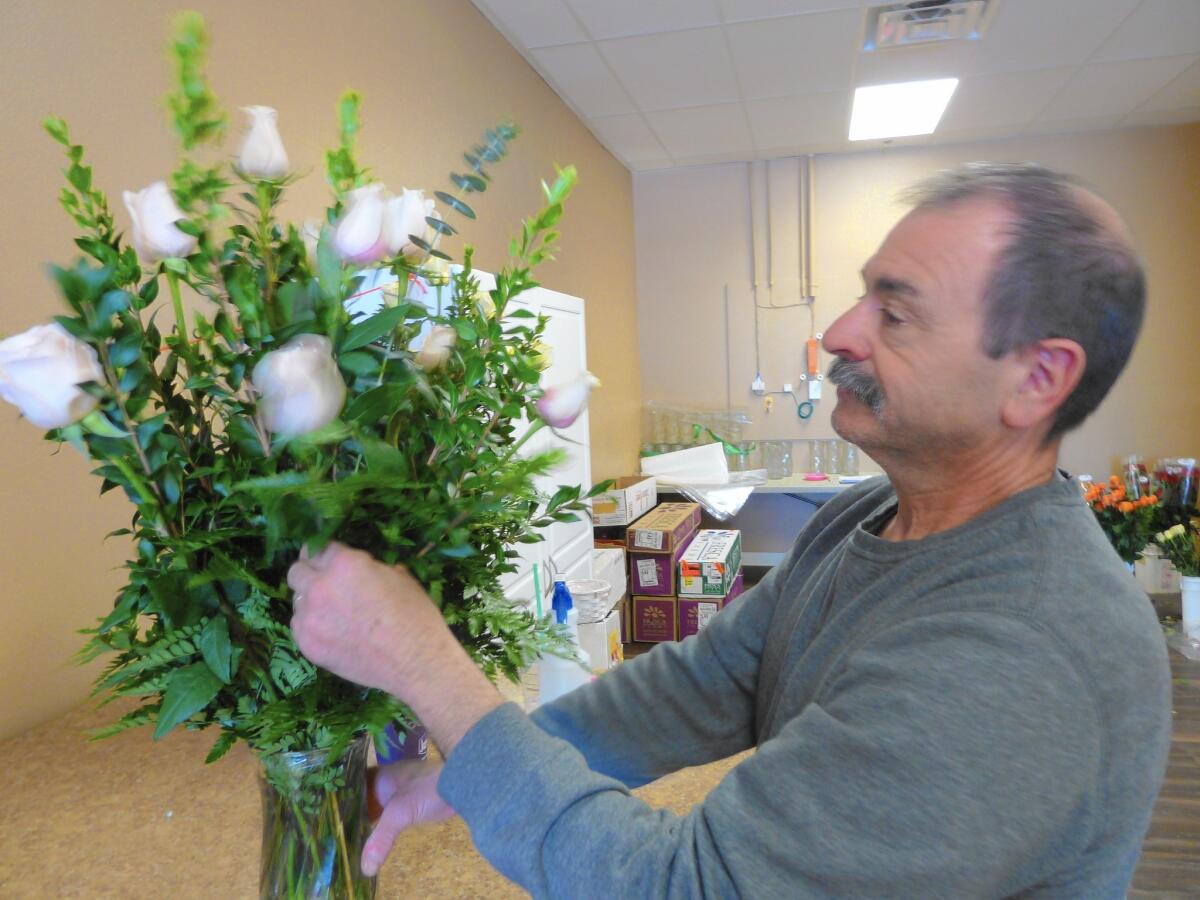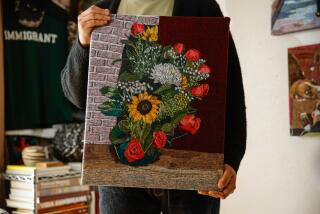Florist to the mob had offers he couldn’t refuse

- Share via
Reporting from Henderson, Nev. — When John Ferraro was a kid in the South Bronx, he thought arranging flowers was for girlie types.
Boy, was he wrong.
Now 62, Ferraro is a slender man with a “New Yawka” accent who’s been in the business for decades — the last 25 years in Las Vegas. He recently opened a shop in this bedroom community after a five-year hiatus from selling roses.
Ferraro works in an area known for its underworld roots, one that promotes its mob museum like Anaheim pitches Disneyland. But he was schooled in the world of organized crime long before he ever arranged a bouquet here.
He learned the trade in New York, where for 15 years he owned Bartel’s flower shop in the South Bronx.
One lesson: Flower shops were often the domain of tough guys, or more specifically, wiseguys.
In the 1930s, Ferraro’s Uncle Joe owned Marywell Florist, a suspected front for a racketeering operation run by mobster Dutch Schultz.
Over the years, guys got whacked — good customers Ferraro knew personally, such as Richard Costello, a union leader who patronized his shop for years. He and his son Richie were shot execution-style in the longshoreman’s office, a crime police assumed was a hit by the Gambino crime family.
Those were the halcyon days in the old neighborhood, where guys in nice suits made deals you couldn’t refuse. These days, Ferraro still flinches when he takes a call that begins, “Hey, Johnny, I got something for ya.”
In the Bronx, his specialty was funerals. His shop was next door to a mortuary that funneled him clients.
Often, Ferraro didn’t want to know any customer’s back story. He never asked questions. But often he would read about a mob hit in the New York Daily News, and days later, he’d be fashioning wreaths for the grieving family.
Ferraro was an accidental florist.
One day, when he was 17, a guy in a bar offered him a job delivering roses. He refused: “I don’t play with flowers.”
Back then, Ferraro lived in tony Westchester County, N.Y., where his carpenter father had moved the family from the South Bronx.
But when it came to John, his father couldn’t take the Bronx out of the boy.
“Tough guys seemed to pop up everywhere I went,” he said, arranging flowers in his shop, Only Roses. “As a kid, I worked in a stable ripe with wiseguys. And I served coffee to clients of a basement bookie joint my friend’s father used to run.”
Flat broke, Ferraro took the job delivering flowers for an Italian widow and her daughter, who pressured him to start snipping petals. “I said, ‘No. I don’t touch flowers. I was hired as a driver.’”
Soon, the shop had a new owner named Victor, who couldn’t tell a long-stemmed rose from a lead pipe. Victor, as they said in the neighborhood, was a piece of work, a scam artist looking for an easy score.
He once borrowed $700 from Ferraro for a can’t-fail money-laundering scheme out of Switzerland that — you guessed it — failed. Victor had a rough side: Ferraro recalls him arguing at the shop with a brute called Charlie Big Bear, who soon turned up dead, shot seven times in a case that was never solved.
Victor eventually went to prison for tax evasion. Ferraro remembers the sheriff showing up at the shop, saying he had to padlock the place: government orders. The kid later slipped in through a side window and continued selling flowers.
One day, Victor called: “Hey, Johnny, I got something for ya.”
He wanted to run a business from the joint, selling flowers to the wives and girlfriends of inmates. But Victor pocketed the money, often without ever even ordering the flowers.
In 1977, Ferraro quit flowers and moved to California.
But his wife, Cindy, got homesick and soon he was back in the Bronx, running Bartel’s on Morris Park Avenue, angering his dad, who said he relocated the family for a reason.
Joe Ribustello, who ran the mortuary next door, was suspicious of the “snotty-nosed kid from Westchester,” until he learned he was Joe’s nephew.
He told Ferraro his Uncle Joe once saved his life from a mistaken mob hit.
The two forged a deal: Ferraro would get all the funeral work he could handle, “no kickback, no nothing,” as long as he removed excess flowers and stands after every viewing.
At times, it seemed the wiseguys were everywhere.
Like the old man who passed the shop every day en route to his nearby coin store, which had no coins. His Aunt Mary, who worked in his store, would elbow Ferraro in the ribs.
“He’s a big shot,” she’d whisper.
Ferraro once saw mobster John Gotti emerge from his Lincoln and go into the mortuary — as surveillance photos were snapped from unmarked police cars across the street. Gotti bought his flowers from somebody else, Ferraro says.
Back then, the South Bronx was scene to so many burglaries that merchants barred their windows. But not Ferraro, who often forgot to lock his door.
But he was never hassled. He had a Godfather, perhaps: Richard Costello.
The union boss came in every holiday to order three $100 arrangements. Eventually, Ferraro had them ready when he walked in. Costello bought a gift for Ferraro’s firstborn; he looked out for him.
And then he was dead.
In 1992, Ferraro sold his flower shop and moved to Las Vegas, seduced by the romance of the desert. Still, he misses his old haunts — all those characters and their inevitable funerals. It was good business.
Recently, a customer asked Ferraro whether he did burial flowers.
The florist smiled.
He sure did.
More to Read
Sign up for Essential California
The most important California stories and recommendations in your inbox every morning.
You may occasionally receive promotional content from the Los Angeles Times.














